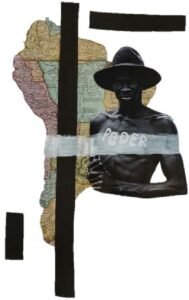The Quilombo as Practice and Strategy
Global Convivial Forum
Fugitivity, or the action of escaping, does not refer to the movement made to avoid a problem; it is a form of exodus, exile, a movement toward the disruption of the Othering mechanism that objectifies Black corporealities and forms of living.
Juliana M. Streva (FU Berlin), former Mecila Junior Fellow (2020-2021).
Brazil, the last country to formally abolish slavery in the West in 1888, is today one of the most unequal countries in the world. It has the fifth-highest rate of femicide and the deadliest police force for Black young people and is considered the place where the lives of lesbian, gay, bisexual, transgender, and queer people are most at risk. Colonial violence, structural violence, institutional violence – an ongoing regime of total violence.
The violent possibilities and impossibilities of Black life have become even more exhaustive in recent years due to the dramatic combination of the rise of far-right neoliberal conservatism and the global COVID-19 pandemic. In striving for being-in-the-world, Black and peripheral women have been, in the words of activist Silvia Baptista:
Reconstituting a quilombo as a rede [a web of support] […] while striving to preserve ourselves, concerning not only the pandemic but primarily hunger; and to reinvent another form of economy based on our communitarian, feminist, and popular traditions (Baptista and IPACS 2020).
The quilombo has been one of the most controversial concepts within Brazilian studies due to its multi-dimensional entanglement with geography, history, anthropology, sociology, law, and politics (Arruti 2015). Nevertheless, it involves much more than the official image of the “runaway slave” (Nascimento 1980). Fugitivity, or the action of escaping, does not refer to the movement made to avoid a problem; it is a form of exodus, exile, a movement toward the disruption of the Othering mechanism that objectifies Black corporealities and forms of living (Nascimento 2018).
Without ignoring its complexity, my working paper “Aquilombar Democracy: Fugitive Routes from the End of the World” (Mecila Working Paper Series, No. 37) focuses on the poetics and politics of the quilombo as an ongoing process of articulating and disputing modes of re-existence and convivial coexistence.
The dialogue woven into the paper involves both scholarly works and published books found in libraries and living archives. Such a confluence was enabled by: (1) listening to 35 women engaged in grassroots movements from Rio de Janeiro, Salvador, and Manaus in 2018; (2) the poetic-politics of Maria Beatriz Nascimento’s work, including the film Ôrí (1988) produced in collaboration with the filmmaker Rachel Gerber; and (3) the digital conversations carried out in 2020 with members of Mandata Quilombo, including Erica Malunguinho and Onir Araújo, a lawyer from the Frente Quilombola and activist of the Movimento Negro Unificado.
By transgressing linear paths, the working paper is composed of two moments (epistemology-methodological remarks and final considerations), two imageries of the quilombo (the soil and the ocean), and three fragments of living archives (Maria Beatriz Nascimento, Marielle Franco, and Erica Malunguinho). By experimenting ontoepistemological folds and geopolitical breaks, this research intends to contribute to confabulating dialogues and articulations within anti-racist, feminist, and decolonial theories and practices from what Lélia Gonzalez called Améfrica Ladina (Gonzalez 1988).
Image credit (cover): Johann Moritz Rugendas, Casa de negros, 1835.
References
Arruti, José Maurício (2015): “Quilombos e cidades: breve ensaio sobre processos e dicotomias”, in: Birman, Patrícia; Márcia Pereira Leite; Carly Machado and Sandra de Sá Carneiro (eds.), Dispositivos urbanos e trama dos viventes: ordens e resistências, Rio de Janeiro: FGV, 217–238.
Baptista, Silvia and IPACS (2020): “O aquilombamento como resposta histórica às violações vividas na zona oeste do Rio de Janeiro”, in: Medium, September 07, 2020, at: https://medium.com/@pacsinstituto/o-aquilombamento-como-resposta-histórica-às-violações-vividas-na-zona-oeste-do-rio-de-janeiro-241a228260b0 (Last access 05.05.2021).
Birman, Patrícia; Leite, Márcia Pereira; Machado, Carly and Carneiro, Sandra de Sá (eds.) (2015): Dispositivos urbanos e trama dos viventes: ordens e resistências, Rio de Janeiro: FGV.
Gonzalez, Lélia (1988): “A categoria político-cultural de Amerfricanidade”, in: Tempo Brasileiro, 92/93, 69–82.
Nascimento, Abdias (1980): O quilombismo, Petrópolis: Vozes.
Nascimento, Beatriz (2018): “‘Quilombos’: mudança social ou conservantismo? [1975]”, in: União dos Coletivos Pan-Africanistas (ed.), Beatriz Nascimento: quilombola e intelectual. Possibilidade nos dias da destruição, São Paulo: Editora Filhos da África, 66–79.
União dos Coletivos Pan-Africanistas (ed.) (2018): Beatriz Nascimento: quilombola e intelectual. Possibilidade nos dias da destruição, São Paulo: Editora Filhos da África.
Juliana M. Streva, levante (sobre António Lebre, 2, 1939)
Juliana M. Streva, visível (sobre Poder, Carlos Vergara, 1976)



